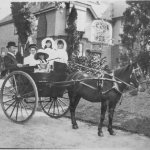your family stories
Clifford Sifton
and
Canada’s Immigration Policy
Clifford Sifton's policy on immigration, as Minister of the Interior for the Liberal government of Prime Minister Sir Wilfred Laurier was one of the principal factors contributing to the increase in immigration to Canada during the years 1896-1905.
Only Farmers Need Apply
Clifford Sifton and the Laurier government desired to populate western Canada with farmers in order to add to the production of the country, solve the “railway problem” and help pay the national debt. The government offered free homesteads to applicants who qualified.
To settle the prairies, Sifton vigorously wooed American farmers, people from Scotland and the North of England, and Eastern and Central European peasants. He believed that only agriculturalists and peasants made desirable settlers.
Town Dwellers Not Desirable
Sifton felt strongly that town dwellers, artisans, shopkeepers and labourers were not desirable immigrants as they didn’t make good pioneers and would increase the population of the major cities, add to unemployment, create slum areas and become a “festering sore…which…will remain as long as Canada endures.”
“When I speak of quality I have in mind, I think, something that is quite different from what is in the mind of the average writer or speaker upon the question of Immigration. I think a stalwart peasant in a sheep-skin coat, born on the soil, whose forefathers have been farmers for ten generations, with a stout wife and a half-dozen children, is good quality. A Trades Union artisan who will not work more than eight hours a day and will not work that long if he can help it, will not work on a farm at all and has to be fed by the public when his work is slack is, in my judgement, quantity and very bad quantity. I am indifferent as to whether or not he is British-born. It matters not what his nationality is;such men are not wanted in Canada, and the more of them we get the more trouble we shall have.”
From: Only Farmers Need Apply: Sir Clifford Sifton, “The Immigrants Canada Wants,” Maclean’s magazine, April 1, 1922, pp. 16, 32-4.
Anti-Sifton Sentiment
Sifton’s definition of a desirable immigrant was not shared by all Canadians. As a result of his policy, there was a backlash from people who saw large numbers of immigrants coming from non-British countries. Canada was a member of the British Empire and English Canadians expected the country to keep its links with their motherland strong by bringing in others with common roots.
Hyphenated Canadians
George Exton Lloyd, writing in 1929, asks “The question for Canada is this: Can we build up a great nation while racial groups with different traditions, instincts, and ideals are being poured in to this country?” and “It will produce in Canada what it has produced in the States, a series of hyphenated Canadians who will demoralize our British institutions.”
Lesser Quality Immigrants
Sifton complained that after he left office as the Minister of the Interior in 1905, the changes in policy resulted in the arrival of a lesser quality of immigrant: “It is quite clear that we received a considerable portion of the off-scourings and dregs of society.”
Herds of the Proletariat
Stephen Leacock, writing in 1911, although referring to immigrants from Europe, comments: “The whole movement of the population has been made easy, automatic, effortless. Steamship companies vie in cheap transportation. Immigration aid societies extend a temporary welcome and the co-operation of national brotherhood.” And these conditions contribute to the arrival of “…herds of the proletariat of Europe, the lowest classes of industrial society, without home and work…”
Were the Shill-Bartholomew Family "Desirable" Immigrants?
The Shill-Bartholomew family benefited from the change in immigration policy after Clifford Sifton left office. John Shill , whose father is claimed to be a “gentleman” on John’s marriage certificate, held a variety of jobs between his marriage and departure for Canada. His daughter spoke of his alcoholism which contributed to his instability as an employee and parent. Not, perhaps, the most desirable class of immigrant.
Furthermore, when the mother and children came over in 1908, the Salvation Army paid their way. The family was expected to, and did, pay the money back once established in Canada.
Were the Shill-Bartholomews the kind of immigrants Clifford Sifton was trying to keep out of the country? Did they contribute positively to Canada and Montreal? Judge for yourselves. Read about the progress of their lives from youth to old age in these web pages.
Return to Canadian Immigration early 1900s
Return to from Clifford Sifton's Immigration Policy to Home Page
Canadian Immigration References


